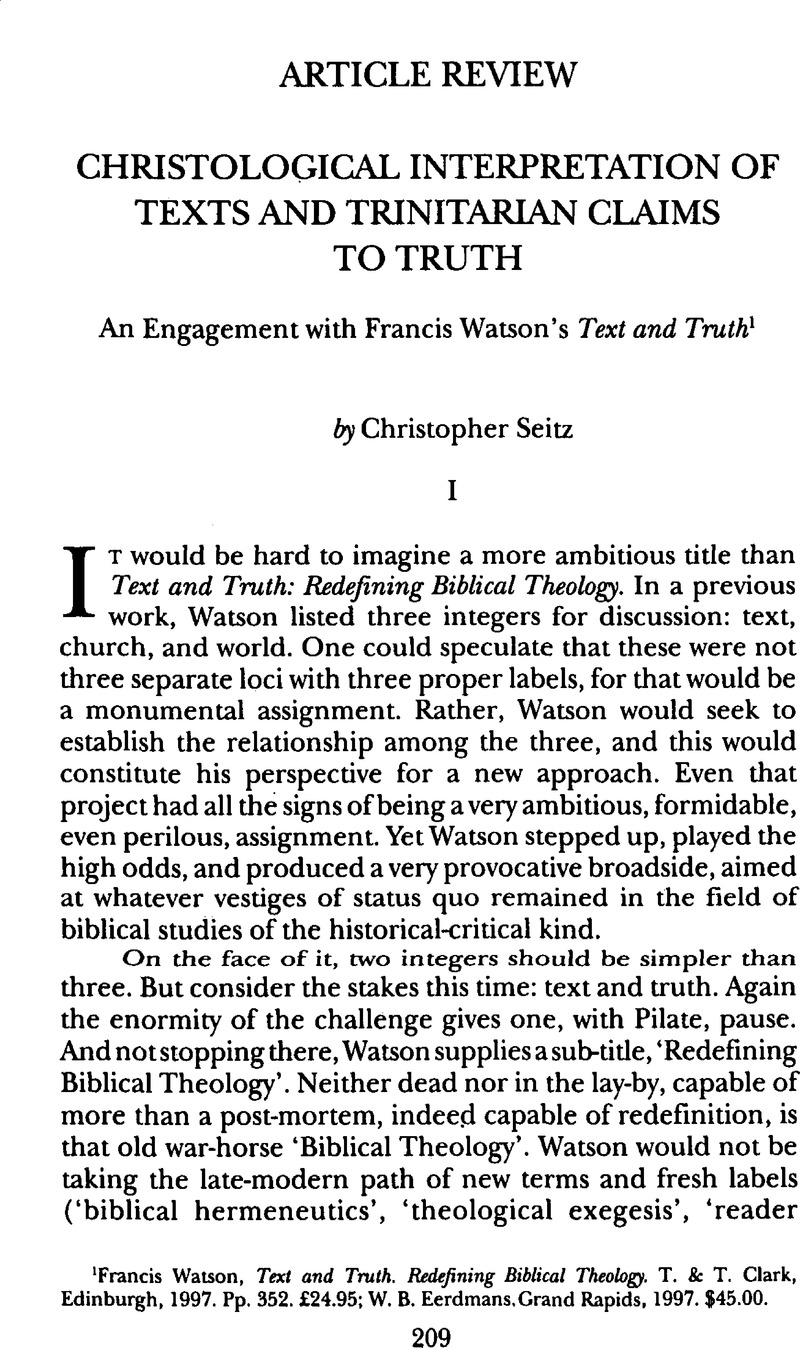Article contents
Christological Interpretation of Texts and Trinitarian Claims to Truth
Published online by Cambridge University Press: 30 January 2009
Abstract

- Type
- Article Review
- Information
- Copyright
- Copyright © Scottish Journal of Theology Ltd 1999
References
1 Watson, Francis, Text and Truth. Redefining Biblical Theology. T. & T. Clark, Edinburgh, 1997. Pp. 352Google Scholar. £24.95; W. B. Eerdmans, Grand Rapids, 1997. $45.00.
2 Fowl, Stephen, Engaging Scripture (Blackwells, 1998).Google Scholar
3 ‘… (the use of Psalm 137) in Christian liturgical contexts can in no circumstances be justified’ (p. 212). In one fell swoop, an entire history of interpretation and usage is cancelled out. He wants to claim this same principle for the New Testament, but the asymmetry is noteworthy: ‘There may be cases where, on the basis of criteria derived from the centre of holy scripture, texts from the Old Testament speak more adequately than texts from the New’ (p. 122). A good control would be if there are cases where the proscription of texts from the New Testament is mandated for public reading. Watson, to the best of my knowledge, has not referred to any. (Obviously we are leaving to the side the sheer intratextual dimension of New Testament indebtedness to the Old Testament, including the love commandment itself! So talk about this or that Testament may in fact prejudge the matter. For a fine treatment of ‘but you have heard that it was said’, see Earle Ellis' recent treatment. This is not a reference to the Old Testament simpliciter. In sum, to talk this way at all creates all sorts of problems, and holds the biblical text hostage to certain moral categories. Ellis, E. Earle, The Old Testament in Early Christianity (WUNT 54, Tübingen: Mohr, 1991).Google Scholar
4 Though I would like early retirement, Fowl with a certain virtuous solicitude reckons my missteps as the consequence of being a ‘professional Old Testament scholar’ and not a theologian (like Kathryn Tanner or Hans Frei). New Testament scholars, one might infer, are more ‘innately’ theological in the nature of the thing (p 126), since they are not dismissed by virtue of being professional scholars. Indeed, in an astonishing aside, Fowl remarks: ‘This raises the further question of the extent to which one can simultaneously function as a professional scholar of the Old Testament and as a Christian theologian’ (emphasis mine, p 126). If this were not silly, it would be scurrilous. In view of his concern with virtue and communal habits, one should assume Fowl has simply overstepped his own rhetorical flourishing.
5 Barr, J., Biblical Faith and Natural Theology (Oxford, Clarendon Press, 1993).Google Scholar
6 Divine Discourse: Philosophical Reflections on the Claim that God Speaks (Cambridge, 1995).Google Scholar
7 See my essay on von Rad's typological effort in Word Without End: The Old Testament as Abiding Theological Witness (Eerdmans, 1998).Google Scholar
8 Word Without End: The Old Testament as Abiding Theological Witness (Eerdmans, 1998)Google Scholar
9 See Blowers, Paul M., ‘The Regula Fidei and the Narrative Character of Early Christian Faith’, Pro Ecclesia 6 (1997) 199–228Google Scholar; Seitz, Word Without End, ad loc; Yeago, David S., ‘The New Testament and Nicene Dogma: A Contribution to the Recovery of Theological Exegesis’, Pro Ecclesia 3 (1994) 152–164.Google Scholar
10 See among many others, the older essay of Childs, B., ‘The God of Israel and the Christian Church’ in Biblical Theology in Crisis (Philadelphia, 1972).Google Scholar
11 It is difficult to improve on Robert Jenson's brilliant and compelling presentation in his recent systematic theology. I intentionally use the typological phrasing adopted by Jenson (‘raised Israel from the dead’) in my question above, because this is precisely what is and has been at stake in Christian confession of the Lordship of Jesus Christ and his according life in relationship to the Father.
12 The Crucified God, London: SCM Press, 1974Google Scholar. See the treatments of patrology in Jenson, but also in Gary Badcock. (Light of Truth and Fire of Love: A Theology of the Holy Spirit, W.B.Eerdmans, 1997) and Alan Torrance (Persons in Communion, T. & T. Clark, 1996).
13 cf. Badcock, op.cit.
14 See, e.g., ‘The God of Israel and the Christian Church’, in Biblical Theology in Crisis (Philadelphia, 1972)Google Scholar; the remarks here included were delivered in 1964.
15 Old and New in Interpretation: A Study of the Two Testaments (Harper and Row, 1966)Google Scholar. The quotations are from pp.149, 153–4.
16 See above all, von Campenhausen, H., The Formation of the Christian Bible (Philadelphia: Fortress, 1972).Google Scholar
- 3
- Cited by


